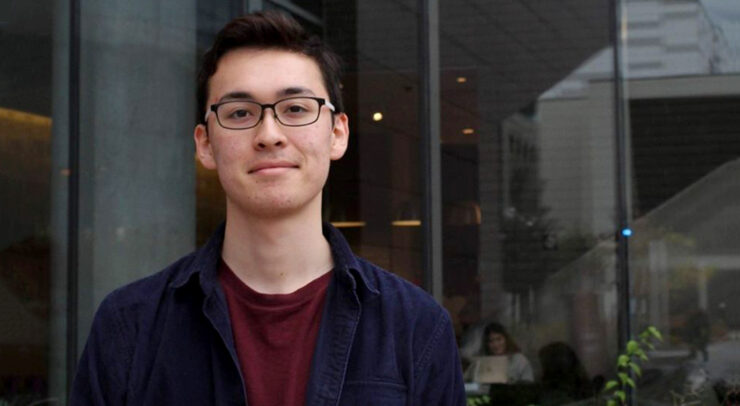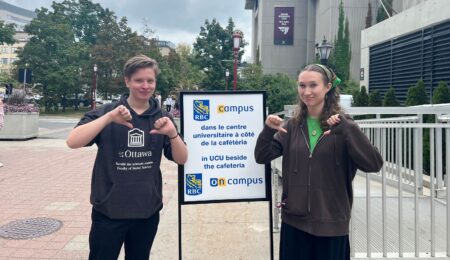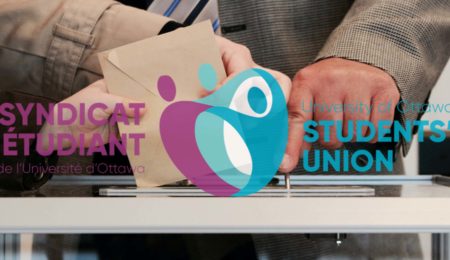The second-year poli sci student is looking to decolonize campus, work with campus mental health groups
This interview is part of our series of articles profiling the executive candidates in the upcoming general elections for the University of Ottawa Students’ Union (UOSU) that will be held from March 25-27. Gulliver is running unopposed for advocacy commissioner. Answers have been edited for length and clarity.
The Fulcrum: Tell us a bit about yourself, including your year and program at the U of O.
Tim Gulliver: I’m currently a second-year political science major. I am currently on the Board of Directors (BOD) for the UOSU. I have also done some work for the International, Political & Policy Studies Student Association as their director of communications. I was a page for the House of Commons last year, so I was really unable to get involved with campus stuff because of my job. But this year, I’ve jumped right in. I’ve made so many amazing friends and discovered so many amazing opportunities and also things we need to work on as a campus, which is why I’m running.
The Fulcrum: What previous experience makes you well-suited to be the UOSU’s next advocacy commissioner?
TG: I was on the BOD, and brought up a lot of different issues. I’ve gone to explore and learn more about what the student union is for, what it kind of looks like, what are some challenges that it faces coming into its second year now. But I think also just as a student; I helped organize protests against the cuts to education and also to the cuts to OSAP and I got to meet so many people that found that extremely important to themselves and their families. Also related to the year, I co-led the protest against the Scientology exhibit here on campus, where they called psychiatry the “industry of death.” I got to meet once again, so many amazing activists that I’ve never met before that were deeply offended by this. As somebody who doesn’t always have great mental health and wants to get involved and could be more financially stable as well, all of these issues matter to me deeply. To see my friends affected in the same way is why I care about it the same way — it reminds me that student unions exist to fight for them. It’s not to fight for our own interests or our own campaign system, which is why I want to fight for them.
The Fulcrum: Why are you running to be advocacy commissioner? What projects or goals do you hope to accomplish if elected to be the UOSU’s next advocacy commissioner?
TG: Building off of what I just said, I think that what really qualifies me and what I want to do with this role comes back to the fact that there’s so much injustice on our campus and so many things that we have to fix, and the only way that we can do that is by tackling those issues specifically head-on.
Tackling and organizing resistance to the cuts to education by the Ford government, demanding that the university does something with its giant profit so that you can help these students who are struggling to figure out if they can go to school next semester — which is crazy in a province as wealthy as ours and a campus where there is so much good.
I want to first of all work on mental health. I definitely want to work with campus groups. There are mental health awareness groups on campus who have so much knowledge on this issue and every single person you speak to on this issue has a new perspective and amazing ideas. We need to make sure that we are working with our student representatives on the president’s advisory committee on mental health to ensure that they are hearing authentically what students want and hearing a wide variety of views.
I also want to push for better academic regulations on mental health. More flexible regulations that can address the root causes of crisis on campus. I think that are a lot of interesting things like looking at how to make more courses pass/fail, or other ways of rewriting the university’s policies for active exemptions that would really go a long way to help students who are often at a disadvantage by the policies that are currently in place by the university.
I mentioned cuts to education and one other thing, housing, which is really important. We’re seeing right now that thousands of students are being evicted from residence by the university. We need to understand what are the rights of students living in residence and what are the rights of students living in Sandy Hill and other neighbourhoods. They are tenants, but they are often uninformed of what their rights are, and I need to educate myself more on this issue. We as a campus need to be more educated on this issue, so I want to have awareness pamphlets in 101 Week kits and things like that so that people are aware of what their rights are, otherwise we are going to be kind of a prey to landlords and higher powers, and my goal in this role is to fight for student interest.
The Fulcrum: What areas of weakness do you see in the UOSU that you would like to improve on next year?
TG: I’m really cautious to label anything in the UOSU as a weakness. I think the UOSU currently is a work in progress and we’re rebuilding the student movement this year. We need all sorts of people, all ages, backgrounds, faculties and experiences, that can come together and make the movement better, because there are issues that matter in terms of justices to individual communities but also issues that bring us all together. We need to fight on both of those fronts to make the university better, more healthier and a more accessible place to live and study.
One area that is also extremely important — this is a lot of reading and this is boring to many people — but just making sure we have better procedures and policies that allow us to make better decisions and allows those decisions to be sound. We need to win back students’ trust and regain their trust. There are a lot of people that are apathetic, who don’t understand what the UOSU is and we need to make sure that the first introduction to the UOSU is a place where things are ethical, and where it’s a voice for students and a voice on the side of students.
The Fulcrum: The mental health crisis on campus has emerged as a major issue for many U of O students. As advocacy commissioner, how do you plan on responding to these concerns and acting on them?
TG: One thing that the outgoing commissioner worked on was a report on mental health. As I understand it, he sat down with many people who gave personal testimonies, and I also was present at the university’s town hall. I heard a lot of amazing ideas, and I think we need to incorporate those ideas into a report, as the advocacy commissioner wanted to, and work with the student senators, Board of Governors reps, and the mental health advisory committees to fight for implementations to some of these changes.
I also think that we also need to call on the university to implement a form of mental health or anti-oppression training for professors and staff. I think the majority of staff are lovely. I’ve had so many amazing reactions to so many professors who have been so accommodating with regards to my own mental health situation. But yesterday, in one of my campaign videos and throughout the year, I received a couple of messages saying, “Look, my professor is saying no such exemptions for my courses, and this prof is saying that if you fail your final or your midterm, you should (die by suicide).” Whether that’s a joke or not is not important — this is an extremely serious issue.
The Fulcrum: Racism and discrimination are also two issues that have come to the forefront for many students over the past year. As advocacy commissioner, how do you plan on responding to these concerns and acting on them?
TG: I’ve heard so many fantastic things from everybody running on these issues. Decolonizing our campus is going to be very difficult work.
I think that my role as advocacy commissioner is to support other positions, other members of executives, as well as other campus groups and their advocacy efforts, specifically in terms of Black and Indigenous students on campus. As white-passing, I hold levels of privilege and I have a perspective that is not of those students. For me, the best I can do is learn how to be an ally, learn how to support and fight tirelessly on the initiatives that they want us to fight on. I think as an ally, it is a very inspiring thing to see so many people of colour running. I think the majority of the (executive) candidates are people (of colour) and I think that shows that the UOSU has been talking to the right people and recruiting the right people, and that students of those communities need this organization to fight for them.
The Fulcrum: How will you approach lobbying the municipal, provincial and federal levels of government on behalf of students? What major issues will you bring forward?
TG: First of all, we need to build relationships with the provincial, federal and municipal levels of government. Those relationships have not yet been fully established. We need to meet with our local city councillor for Rideau-Vanier, who is Mathieu Fleury. We also need to meet with MPPs in the region, especially Lucille Collard who was recently elected, and other MPPs across the city as well.
We obviously need to build relationships with the federal levels. I don’t really think UOSU has had the chance to do that because of the constraints they have had this year. One of the luxuries of coming into the UOSU after than transition began and in a more laid back role in my first year of involvement is that I didn’t have to do the kind of hard work that people don’t really see, such as all the operational stuff. Now, in its second year, there’s the privilege of being able to develop those relationships with provincial, municipal, and federal governments.
Municipally, we need to work on housing for sure. Federally, we need to work on education affordability, and on also resolving the mental health crisis. The province currently has control over psychiatrists, making it harder for the university to do anything about the psychiatry aspect. I think in terms of engagement, I will do what I have always done, which is to keep an open mind and go in there with good intentions and seek to build a real relationship.
But the role of a union isn’t to walk on eggshells when things are going wrong — it’s to fight. If there are levels of government that aren’t responding, that are disrespecting, going against the interests of the students, I will hold them accountable and try to pressure them as needed to take the actions necessary. This in regards to some of these students, whether or not they can afford to go to school or not, or whether they can continue living in the place they lived in. It is about whether they feel like campus is a safe space for them to be. These are serious issues and we need to tackle them with the urgency required, and I want to convey that to those representatives as well as the university.
The Fulcrum: How will you approach lobbying the U of O administration on behalf of students? What major issues will you bring forward?
TG: This is a difficult question — on one hand, walking on eggshells and being afraid to challenge the administration does students who need a strong voice for justice a disservice. On the other hand, we must be cautious not to burn down bridges or avenues that we could use to get results. With that in mind, I want to strike a balanced approach, working on a case-by-case basis. On the mental health file, for example, I happen to believe that the solutions that students need are bold, ambitious ones, and as the UOSU does not have a seat on the mental health advisory committee, we will have to work with our student reps as well as organize to keep up the pressure on the administration. On the climate file, we need a concrete commitment to divestment. On social justice and decolonization, we need to elevate the voices of activists from the most affected communities into the rooms where decisions are made. On tuition and OSAP, recognizing that the university had their budget cut as well, we need to open a dialogue and find ways to provide students most hit by the cuts and international tuition fee hikes with financial support.
At the end of the day, however, nothing can be accomplished without organizing and mobilizing, speaking directly to those who want to work on a specific issue. Quebec student unions have had massive success with this approach. As someone from Quebec, I want to take a leaf out of their book.*
The Fulcrum: Why should students vote for you?
TG: I think students should vote for me, and it would be an honour for them to vote for me, because I have done the work over the past year; listening and engaging with students, but using my platform as a member of the BOD to fight on their behalf — to fight on issues that bring us together. As I mentioned, mental health, housing, climate change, decolonization, anti-racism — these kinds of issues and I want to continue that work. I want to continue with a bigger platform so that I can continue to empower students in that way.
I have lots of things to learn as well. I am just one person. I am a second-year student coming in with a lack of lots of perspectives, and I want to listen, learn and grow in that way, and to use those experiences to help form a better union. I understand the issues that matter to students. I want to keep on learning and understanding more. I am in this not because I want to pursue my own personal interest: I want to continue showing up for students.
*Question answered in a written statement.





